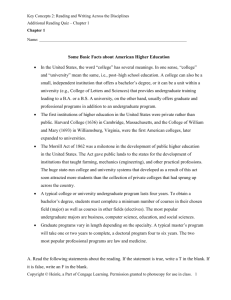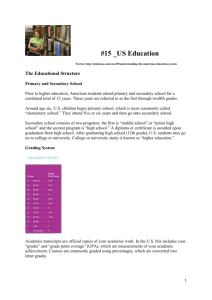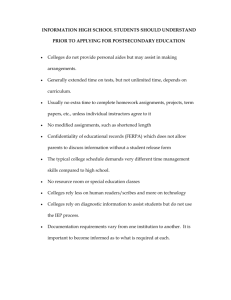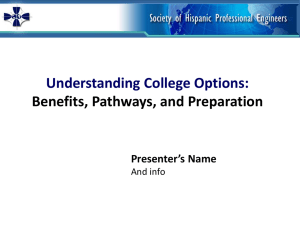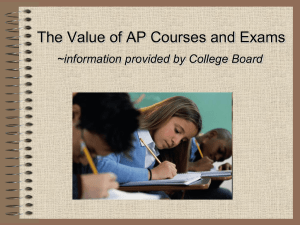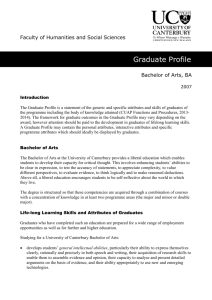Guess Who's Coming to Campus: - Education Writers Association
advertisement
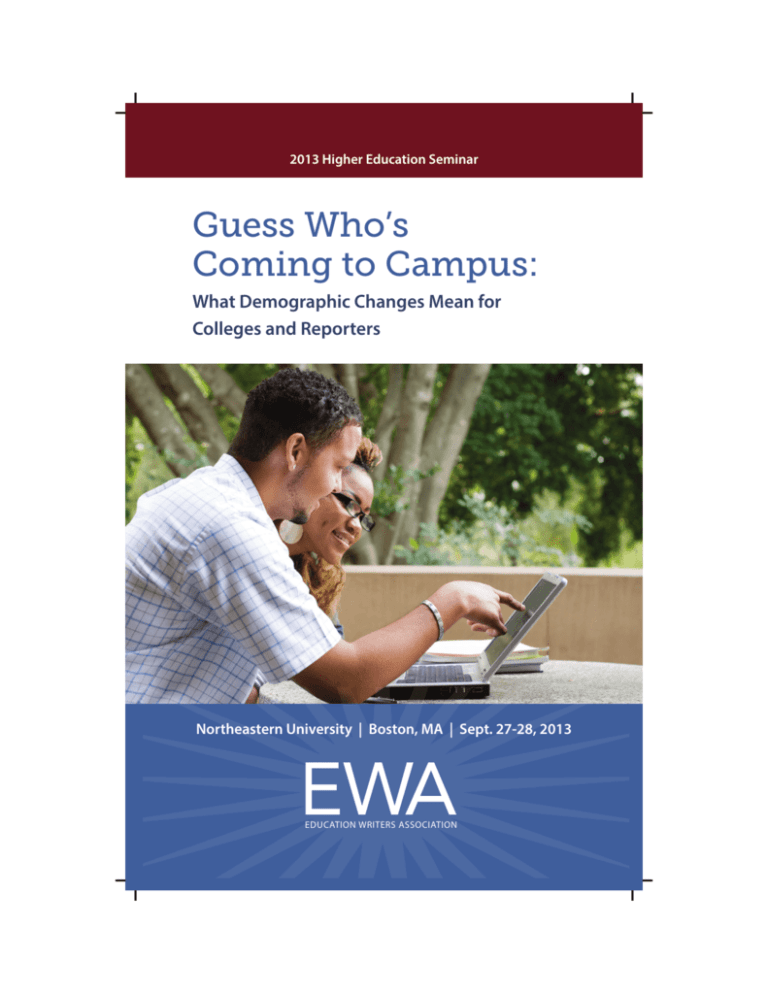
2013 Higher Education Seminar Guess Who’s Coming to Campus: What Demographic Changes Mean for Colleges and Reporters Northeastern University | Boston, MA | Sept. 27-28, 2013 EDUCATION WRITERS ASSOCIATION Our students traNsform the world. and themselves. Our signature integration of study and experience in 92 countries is the best education for the 21st century. northeastern.edu Welcome Dear Colleague, Welcome to Boston! We’re delighted you could join us for Guess Who’s Coming to Campus: What Demographic Changes Mean for Colleges and Reporters. This is a pivotal time in higher education: Colleges and universities around the country are already starting to see big shifts in the make-up of their student bodies. That means more black and Latino students, more low-income students, more veterans, more adult learners, and more applicants who represent their families’ first entry into postsecondary education. This explosion of diversity is unprecedented, and its implications will be reflected in nearly every story you write on your beat. Over the next two days, some of the best minds in education will talk about the challenges schools are facing, their causes, and what to expect as you report on this fascinating generation of college students. I hope you come away from this conference with fresh perspective, better context and lots of ideas for compelling stories. As always, I’m looking forward to the coverage you produce. Caroline Hendrie Executive Director This seminar is hosted by Northeastern University. It is made possible in part by a grant from Lumina Foundation, as well as support from Pearson, the American Council on Education, and Blackboard Inc. EWA retains editorial control over all programming. 1 #EWAHiEd Agenda #EWAHiEd Friday, September 27 12 - 1 p.m. Lunch & Welcome Caroline Hendrie, Executive Director, Education Writers Association 1 - 2:15 p.m. The Changing Face of College The next few years could be a turning point for higher education, as the traditional student population starts to shift dramatically. How long will the total number of new high school graduates continue to decline? Of that pool of students, what percentages will be black and Latino or from low-income backgrounds? What will these changes herald for postsecondary education? Bridget Terry Long, Academic Dean, Harvard Graduate School of Education Brian Prescott, Director of Policy Research, Western Interstate Commission for Higher Education Larry Gordon, Higher Education Writer, Los Angeles Times (moderator) 2:15 - 2:30 p.m. BREAK 2:30 - 3:30 p.m. The Struggle to Fill Seats With the total numbers of new high school graduates dropping while tuition prices rise, many private colleges and universities have seen their enrollment numbers decline. Because most of these schools depend on tuition revenue in order to operate, these shortfalls pose serious threats to their existence. Which schools are in jeopardy and why? 2 #EWAHiEd Jarrett L. Carter Sr., Founder and Editor, HBCUDigest.com William S. Reed, Chair, Davis Educational Foundation Jon Marcus, Higher Education Editor, The Hechinger Report (moderator) 3:30 - 4:45 p.m. Getting In: The Debate Continues For many students, the first hurdle in their pursuit of a degree is the admissions process. As the debate swirls about whether colleges should offer special considerations—whether race-based or class-based—in choosing which students to accept, what is known about how much access students of all backgrounds have to higher education? Stella Flores, Assistant Professor, Vanderbilt University Peabody College of Education & Human Development Matt Gaertner, Research Scientist, Center for College & Career Success at Pearson Jeff Strohl, Director of Research, Georgetown University Center on Education and the Workforce Richard Pérez-Peña, Reporter, The New York Times (moderator) 4:45 - 5 p.m. BREAK 5 - 6 p.m. The 10 Higher Education Stories You Should Be Covering This Year From the “gainful employment” debate to what’s next for MOOCs, Inside Higher Ed Editor Scott Jaschik offers his ideas on topics in postsecondary education that journalists should be tracking. Scott Jaschik, Editor and Co-Founder, Inside Higher Education 6 - 7:15 p.m. Dinner Speaker: Joseph E. Aoun, President, Northeastern University 7:30 - 8:30 p.m. Reception 3 #EWAHiEd Saturday, September 28 8 - 9 a.m. BREAKFAST 9 - 10:15 a.m. Obama’s Proposal: Will Performance Ratings Hurt Student Access? Last month, President Obama unveiled an ambitious proposal to reform higher education by tying a college’s access to federal financial aid for students to a new set of ratings the government would produce. Would universities, forced to focus more on student outcomes, be less inclined to enroll students from backgrounds that traditionally have been underserved by higher education? Terry Hartle, Senior Vice President, American Council on Education Matt Reed, Vice President of Academic Affairs, Holyoke Community College Zakiya Smith, Strategy Director, Lumina Foundation Scott Jaschik, Editor and Co-Founder, Inside Higher Ed (moderator) 10:15 - 11:15 a.m. Tracking Veterans’ Success About 250 community colleges and four-year institutions recently have pledged to track veterans’ outcomes and support them on campus through a new program of the U.S. Department of Education. How much do we know about the recent success rates of veterans at American colleges and what services exist to support them? Peter Buryk, Senior Project Associate, RAND Corporation Marc V. Cole, Senior Adviser for Veterans and Military Families, U.S. Department of Education Ashley Parker-Roman, U.S. Navy veteran and undergraduate at Drexel University Libby Nelson, Education Reporter, Politico Pro (moderator) 4 #EWAHiEd 11:15 a.m. - 12:30 p.m. Building Better Stories: Covering Demographic Change at Colleges and Universities In this workshop, journalists will have the opportunity to exchange advice and ideas about the most effective techniques for reporting and writing about the changes happening on college campuses due to changes in the student population. 12:30 - 1:30 p.m. Lunch & Keynote Speaker: United States Senator Elizabeth Warren 1:30 - 2:30 p.m. Making the Most of Online Education Research has found that the types of students most likely to opt for online courses for reasons of access, including low-income, black and Latino students, are the same students who statistically are less likely to succeed in those courses. What practices and programs work to overcome this trend? Thomas Bailey, Director, Community College Research Center Jay Bhatt, President and CEO, Blackboard Inc. Bror Saxberg, Chief Learning Officer, Kaplan Inc. Steve Kolowich, Staff Reporter, The Chronicle of Higher Education (moderator) 2:30 - 3:30 p.m. Black and Latino Males: Getting To and Through College Shaun Harper, director of the Center for Study of Race and Equity in Education at the University of Pennsylvania Graduate School of Education, previews new research on how New York City addressed the challenge of guiding more of its black and Latino male students to postsecondary success. Shaun Harper, Associate Professor, University of Pennsylvania Graduate School of Education 3:30 - 3:45 p.m. BREAK 5 #EWAHiEd 3:45 - 5 p.m. Innovation Showcase: New Lessons for Adult Learners What options offer the best pathways to a degree for adult learners? Leaders in the field offer their views and respond to reporters’ questions. Allison Barber, Chancellor, Western Governors University Indiana Felice Nudelman, Chancellor, Antioch University Deborah Santiago, Excelencia in Education Katherine Mangan, National Correspondent, The Chronicle of Higher Education (moderator) 6 #EWAHiEd Speaker Bios Joseph E. Aoun is the seventh president of Northeastern University. He came to Northeastern from the University of Southern California’s College of Letters, Arts and Sciences, where he was dean. His academic honors include the Chevalier dans l’Ordre des Palmes Academiques from the French government and the Robert A. Muh Award from MIT’s School of Humanities, Arts and Social Sciences. He is a member of the American Academy of Arts and Sciences, chair of the American Council on Education in 2012-13, and serves on the U.S. Department of Homeland Security’s academic advisory council. He received his doctorate in linguistics and philosophy from MIT and advanced degrees from the University of Paris VIII and Saint Joseph University (Lebanon). Contact him by reaching Susie Guszcza at s.guszcza@neu.edu. Thomas Bailey is director of the Community College Research Center (CCRC) and a professor of economics and education at Teachers College, Columbia University. Bailey established CCRC at Teachers College in 1996 with support from the Alfred P. Sloan Foundation. In addition to CCRC, he also serves as director of the national Center for Analysis of Postsecondary Education and Employment (CAPSEE), which is funded by the Institute of Education Sciences. From 2006 to 2012, Bailey directed the National Center for Postsecondary Research, also funded by the Institute of Education Sciences. In 2010, Bailey was appointed by U.S. Secretary of Education Arne Duncan to chair the Committee on Measures of Student Success, which developed recommendations for community colleges to comply with completion rate disclosure requirements under the Higher Education Opportunity Act. Bailey received the AERA Division J (Postsecondary Education) Exemplary Research Award in 2012 and in the same year was elected as a member of the National Academy of Education. Bailey holds a doctorate from MIT with specialties in education, labor economics and econometrics. Contact him at ccrc@columbia.edu. Allison Barber is the Chancellor of Western Governors University Indiana, the state’s new online, competency-based university. A native Hoosier and graduate of Indiana University, she is leading WGU Indiana from its Indianapolis office. Prior to her position at WGU Indiana, Barber 7 #EWAHiEd was the president of her own strategic communication firm in the Washington, D.C., area. She was also an adjunct professor at Georgetown University, teaching in the master’s program for Public Relations and Corporate Communications. Barber has extensive experience in public relations and advertising. She spent over seven years at the Department of Defense, working as deputy assistant Secretary of Defense for Internal Communications and Public Liaison. Barber was also president of the Washington, D.C., office of PlowShare, a Connecticut-based advertising agency. From 1992 to 1998, she was a public relations director for the American Red Cross. From 1986 to 1991, Barber was a grade school teacher at Merrillville Public School in Indiana and served as vice president of the Teachers Association. Barber holds a bachelor’s in elementary education from Tennessee Temple University and a master’s in Elementary Education from Indiana University. Contact her at allison.barber@wgu.edu. Jay Bhatt is president, chief executive officer and a board member of Blackboard Inc., a global leader in technology and services aimed at making education more immediate, direct and personalized for learners. Jay previously served as president and CEO of Progress Software. Prior to his role at Progress, Jay was senior vice president of the global architecture, engineering and construction solutions division at Autodesk Inc. In this role, he oversaw software development, marketing, product management, product design, business development, finance and human resources. Jay joined Autodesk through the acquisition of Buzzsaw.com, a privately held cloud-based software company where he was chief financial officer and senior vice president of business development. Before Buzzsaw.com, Jay worked as an investment banker and as a transactional attorney. Jay holds a bachelor of arts degree from the University of Pennsylvania and a juris doctor degree from the University of California, Los Angeles (UCLA) School of Law. Peter Buryk is senior project associate at the RAND Corporation, where his research focuses on the education and well-being of military service members, veterans and their families, as well as implementation and impacts of the Post-9/11 GI Bill. He is currently involved in a study examining variations in the labor market outcomes of college-educated veterans based on the type of postsecondary institution attended (public, private for-profit, etc.). Buryk is a Navy veteran, having served 8 #EWAHiEd eight years on active duty, and continues to serve in the Naval Reserve. He is also the proud parent of three and a military spouse of a Navy physician. Contact him at pburyk@rand.org. Jarrett L. Carter Sr. is the founding editor of HBCUDigest.com, an online daily news site dedicated to coverage of historically black colleges and universities throughout the United States. He is also the host of HBCU Digest Radio, a weekly talk radio program covering societal, cultural and institutional issues at HBCUs. Carter is also the founder and executive director of the Center for HBCU Media Advocacy, a national nonprofit organization working to enhance HBCUs’ new media and media outreach opportunities. A native of Seat Pleasant, Md., Carter graduated from Morgan State University in 2003 with a bachelor's degree in English with a journalism concentration. Carter lives in Baltimore with his wife and two sons. Contact him at carter@hbcudigest.com. Marc V. Cole serves as the senior advisor for Veterans and Military Families in the Office of Innovation and Improvement at the U.S. Department of Education. Cole helps steer the Education Department’s focus on K-12 and postsecondary education opportunities and outcomes as they relate to military-connected students and families. Before joining the Education Department, Marc spent 12 years on active duty in the Marine Corps in various leadership, strategic planning, intelligence, data analysis, public policy and workforce capacity-building roles. Cole’s career includes overseas deployments to Iraq and Japan, and work in Africa and Afghanistan. Cole holds a bachelor’s degree in English and Linguistics from Atlanta's Morehouse College. Through the Post 9/11 GI Bill, he earned three master’s degrees, including a master’s in education from Harvard’s Graduate School of Education. Contact him at Marc.Cole@ed.gov. Stella Flores is a professor at Vanderbilt University, where she teaches courses in college access policy and general education policy. Previously, she served as a program evaluator for the U.S. General Accountability Office and as a program specialist for the Economic Development Administration of the U.S. Department of Commerce. Flores also has served as a policy researcher for the Texas State Legislature and various city governments in Texas. Flores investigates the impact of state and federal policies on college access and 9 #EWAHiEd completion for low-income and underrepresented populations. She has written on the role of alternative admissions plans and financial aid programs in college admissions, demographic changes in higher education, the role of Hispanic-serving institutions in U.S. higher education policy, and Latino students and community colleges. Her work has been cited in cases argued before the U.S. Supreme Court. Flores holds a doctorate in Administration, Planning, and Social Policy with a concentration in Higher Education from Harvard University, a master’s from Harvard University and The University of Texas at Austin, and a bachelor’s from Rice University. Contact her at stella.m.flores@vanderbilt.edu. Matthew N. Gaertner is a research scientist in the Center for College and Career Success at Pearson. His research focuses on the effects of educational policies and reforms – at both the postsecondary and K-12 levels – on student access, persistence and achievement. Gaertner’s work has been published in Educational Evaluation and Policy Analysis, and his research on affirmative action has been recognized by numerous professional organizations. He was awarded a Spencer Foundation Dissertation Fellowship and an Association for Institutional Research Dissertation Grant. Gaertner also received the 2012 Charles F. Elton Best Paper Award from the Association for Institutional Research and was named the 2011 Outstanding Doctoral Graduate at the University of Colorado. He earned a doctorate in Research and Evaluation Methodology from the University of Colorado at Boulder. Contact him at matthew.gaertner@pearson.com. Larry Gordon is a higher education writer at the Los Angeles Times, where he was previously an assistant city editor. Before moving to California, he worked at the Bergen Record and Hudson Dispatch in his native New Jersey. Gordon was a mid-career Fulbright Scholar teaching journalism at the American University in Bulgaria. He graduated from Georgetown University and has a master’s from Columbia University’s Graduate School of Journalism. Contact him at Lawrence.Gordon@latimes.com. Shaun R. Harper is an associate professor at the University of Pennsylvania Graduate School of Education and director of the Center for the Study of Race and Equity in Education. Harper has prior professional experience in undergraduate student affairs, graduate 10 #EWAHiEd recruitment and admissions, and academic program administration. Formerly he served as an assistant professor and executive director of the Doctor of Education Program at the University of Southern California. Harper has published nine books and more than 75 peerreviewed journal articles, book chapters, and other academic publications. His research has been praised by the Association for the Study of Higher Education (2008 Early Career Award), the National Association of Student Personnel Administrators (2010 Outstanding Contribution to Research Award), and the American Educational Research Association (2010 Division G Early Career Award). Contact him at sharper1@gse.upenn.edu. Terry W. Hartle is senior vice president at the American Council on Education. He engages federal policymakers on a broad range of issues including student aid, government regulation, scientific research and tax policy. His work involves representation before the U.S. Congress, administrative agencies and the federal courts. As an expert voice on behalf of colleges and universities, he is quoted widely in both the national and international media on higher education issues. Given ACE’s historic role in coordinating the government relations efforts of some 60 associations in the Washington-based higher education community, Hartle plays a central part in developing public policy positions that affect all colleges and universities. He also works with the United States Agency for International Development (USAID) in its higher education outreach efforts abroad. Prior to joining the ACE in 1993, Hartle worked as an education staffer in the U.S. Senate on a committee chaired by Sen. Edward M. Kennedy. Hartle also contributes regular book reviews to The Christian Science Monitor. He received a doctorate in public policy from The George Washington University, a master’s in public administration from the Maxwell School at Syracuse University, and a bachelor’s degree in history (summa cum laude) from Hiram College. Contact him at (202) 939-9355. Caroline Hendrie is executive director of the Education Writers Association, the national professional organization for members of the news media who cover education. She leads strategy, development and programming for the nonprofit organization in support of its mission to increase the quantity and quality of education coverage to better inform the public. EWA advances high-quality education journalism through knowledge and skills training, customized reporting support, 11 #EWAHiEd digital resources, and recognition for exemplary coverage. Hendrie was herself an award-winning education journalist for more than two decades, with experience covering education from early learning through postsecondary schooling at the local, state, and national levels. From 1996 to 2010, Hendrie held various editing and reporting positions, including managing editor, at Education Week. She started at daily newspapers in Connecticut and spent seven years as state education writer and editor at The Record, a daily newspaper based in Bergen County, N.J. She is a graduate of Wesleyan University. Contact her at chendrie@ewa.org. Scott Jaschik is the editor and co-founder of Inside Higher Ed. He coleads the editorial operations, overseeing news content, opinion pieces, resources and interactive features. He has published articles on colleges in The New York Times, the Boston Globe, the Washington Post and Salon. From 1999 to 2003, he was the editor of The Chronicle of Higher Education. He is a graduate of Cornell University. Contact him at scott.jaschik@insidehigered.com and (202) 659-9208. Steve Kolowich is a staff reporter covering technology for The Chronicle of Higher Education. Kolowich was most recently the technology reporter for Inside Higher Education. His freelance articles have appeared in the Washington City Paper and on Slate. Steve is a graduate of Bowdoin College and was editor-in-chief of the weekly student paper there. Contact him at steve.kolowich@chronicle.com. Bridget Terry Long is academic dean of the Harvard Graduate School of Education. An economist with expertise in access to higher education and college student success, Long joined the Ed School as an assistant professor in 2000, and became a professor in 2009. Long’s research examines the transition from high school to higher education and beyond, focusing on college access and choice, factors that influence student outcomes, and the behavior of postsecondary institutions. In June 2010, Long was appointed by President Barack Obama and confirmed by the U.S. Senate to serve as a member of the National Board of Education Sciences, the advisory panel of the Institute of Education Sciences in the U.S. Department of Education. She was elected chair of the board in October 2011. She is currently a faculty research associate of the National Bureau of Economic Research (NBER) and served as a visiting scholar at the New England Public Policy Center 12 #EWAHiEd of the Federal Reserve Bank of Boston. Long received her doctorate and master’s from the Harvard University Department of Economics and her bachelor’s from Princeton University. Contact her at bridget_long@gse.harvard.edu. Katherine Mangan is a national correspondent for The Chronicle of Higher Education and is based in Austin, Texas. She worked in Washington as a Chronicle staff writer covering faculty issues before moving to Austin as a correspondent. She has covered such stories as the aftermath of Hurricane Katrina and the bruising battles over higher education in Texas. She has also written extensively about the state of legal education, the effect of health reform on medical schools, and ethics in business education. Since joining the Students section of The Chronicle, Mangan has focused on students’ preparedness and remediation, dual enrollment, transfer, access, and completion. She also contributes features to the People section. Prior to joining the Chronicle in 1986, she covered courts and crime for The Fort Lauderdale News and Sun-Sentinel and was a reporter and world-desk editor for the Associated Press. Mangan is a 1981 graduate of Williams College. Contact her at katie.mangan@chronicle.com. Jon Marcus is higher education editor at the Hechinger Report and has also written about higher education for the Times (U.K.) Higher Education magazine, the Boston Globe Magazine, The Washington Post, The New York Times, USA Today, and other magazines and newspapers, and was a contributor to the book Reinventing Higher Education. Contact him at jmarcus@hechingerreport.org. Libby A. Nelson is an education reporter for Politico Pro and the author of Morning Education, an early morning newsletter. Before joining Politico, she was a reporter at Inside Higher Ed, where she covered federal higher education policy – including Congress, the Education Department and higher education issues in the 2012 campaign – and religious colleges. After various internships, including at The New York Times, her first real job in journalism was in Scranton, Pa., where she worked as a regional reporter for the Times-Tribune. Nelson is a 2009 graduate of Northwestern University. Contact her at lnelson@politico.com. 13 #EWAHiEd Felice Nudelman is chancellor of Antioch University. She has spent the majority of her career in education, both on and off college campuses. Before Antioch, she was executive director of education for the New York Times Company. She oversaw the development of its Knowledge Network in 2007, a new business model in e-Learning that links colleges and universities to create and deliver online courses and certificates, including those taught by New York Times journalists. In 2010, she led the Times Company’s collaboration with the Texas Education Agency to launch Project Share, a statewide initiative for 400,000 teachers and four million K-12 students. She helped launch and is co-director of the American Democracy Project (ADP), a collaboration with the American Association of State Colleges and Universities, to foster student civic engagement. Nudelman also served as executive director for Pace University’s School of Education. In 1997, she received Pace’s Outstanding Contribution award for her work. Previously, Nudelman spent nearly a decade in academic affairs at Bloomfield College, where she was awarded the National Academic Advising Association’s award for Best Advising Program in the country. She obtained her bachelor’s in fine arts and philosophy from Allegheny College and her master’s in fine arts in photography from Pratt Institute. She is also an alumna of the 1995 Harvard Management Development Program. Contact her at (937) 769-1351 and fnudelman@antioch.edu. Ashley Parker-Roman is a senior at Drexel University. She is also a current member of the Student Veterans of America National Student Council, where she provides nonbinding advice, recommendations and guidance to the executive director of Student Veterans of America. Parker-Roman is a Navy veteran, having served four years active duty on the USS Bataan, LHD-5. She currently serves as a member of the Drexel Undergraduate Student Government Association and the Dean of Student’s Advisory Committee. This past summer, Parker-Roman was one of 28 veterans selected to participate in the NYSE Euronext Veteran Associate Program, and is now a communication and events intern with QVC Inc., located in West Chester, Pa. Contact her at ashley.o.roman@gmail.com. Richard Pérez-Peña covers higher education for The New York Times. He has been with the paper since 1991 and has reported on government, politics, health care, media, law, disasters and transportation. He was born in Cuba and grew up in California. His 14 #EWAHiEd parents were teachers. Pérez-Peña attended public schools and then Pomona College. He’s been a journalist for 28 years, “partly because it suits me and partly because I’m not qualified to do anything else,” he says. His wife is a nurse and they have two sons, who are in high school. Pérez-Peña tries to convince them that if he irritates every single college they might want to go to, it isn’t on purpose. Contact him at rpp@nytimes.com. Brian T. Prescott is the director of policy research at the Western Interstate Commission for Higher Education (WICHE). In this role, he comanages WICHE’s Policy Analysis and Research unit, with primary responsibility for obtaining and analyzing education and workforce data with public policy relevance. He is author of the two most recent editions of Knocking at the College Door, WICHE’s widely-used projections of high school graduates by state and race/ethnicity. Additionally, he manages grant- and contract-funded projects and authors occasional policy briefs, chapters, and research reports. Prescott has experience working directly with states on issues of access, success, affordability, accountability, workforce development, and data systems development. Currently, he is managing WICHE’s Gates Foundation-funded project to develop a multistate longitudinal data exchange. He also serves on the board of directors of the National Association for College Admission Counseling. Prescott earned a doctorate in higher education from the University of Virginia. He also holds degrees from the University of Iowa and the College of William and Mary. Contact him at (303) 541-0255. Matthew Reed is the vice president for academic affairs at Holyoke Community College in Holyoke, Mass. He is also the author of “Confessions of a Community College Administrator” (Jossey-Bass, 2013), and has written the blog “Confessions of a Community College Dean” for Inside Higher Ed since 2007. Prior to joining HCC, he worked as a liberal arts dean at the County College of Morris in New Jersey and at DeVry University in both faculty and administrative roles. He received a bachelor’s degree in political science from Williams College and a doctorate in political science from Rutgers University, and has taught at Rutgers, Kean University, DeVry, and CCM. Contact him at mreed@hcc.edu. 15 #EWAHiEd William S. Reed is chair of the Davis Educational Foundation and a trustee of Colby-Sawyer College. Reed retired from Wellesley College in 2002, where he served as its vice president for finance and administration since 1990. Prior to Wellesley he served as the vice president and treasurer of Williams College, the vice president for development at Kenyon College, and the director of personnel at Princeton University. Reed also worked for the Ford Foundation in India and New York. He began his career with the U.S. Atomic Energy Commission where he was the chief of administration for the AEC’s Health and Safety Laboratory. He is also the founder of the Boston Consortium for Higher Education. Reed earned his bachelor’s degree from Kenyon College and a master’s in public administration from the Maxwell School of Syracuse University. Contact him at willreed37@gmail.com. Deborah A. Santiago is the co-founder, chief operating officer and director of research at Excelencia in Education. She has spent more than 15 years leading research and policy efforts from the community to national levels to improve educational opportunities and success for all students. Her current research focuses on state and federal policy, financial aid, effective institutional practices, and student success in higher education. She has been cited in numerous publications, including The Economist, The New York Times, The Washington Post, AP, The Chronicle of Higher Education, Inside Higher Ed, and Diverse Issues in Higher Education. Santiago serves on the board of the Latin American Youth Center (DC) and the National Association for College Admission Counseling. She also serves on the advisory boards of Univision’s Education Campaign and the Pathways to College Network. Santiago has a bachelor’s degree in economics from Mary Washington College, a master’s degree in urban affairs from Virginia Tech, and doctoral studies at the University of Southern California. Contact her at dsantiago@edexcelencia.org. Zakiya Smith is currently a strategy director at the Lumina Foundation, the nation's largest foundation dedicated solely to higher education. At Lumina, she works to develop new models of student financial support for higher education. Prior to her work in philanthropy, Smith served as a senior adviser for education at the White House Domestic Policy Council, where she was tasked with developing President Obama's higher education policy. Smith also served in the Obama administration 16 #EWAHiEd as a senior adviser at the U. S. Department of Education. Earlier in her career, Smith trained new teachers for Teach For America and assisted high school students with the college application process through the federal GEAR UP program in East Boston, Mass. She was introduced to federal policy as an intern on Capitol Hill with the Congressional Black Caucus Foundation, working for her former hometown Congresswoman. Smith was recently named one of Forbes’ top 30 under 30 in education. Smith holds a bachelor’s degree in political science and secondary education from Vanderbilt University, and a master’s degree in education policy and management from the Harvard Graduate School of Education. Contact her at zsmith@luminafoundation.org. Jeff Strohl is the director of research at the Georgetown University Center on Education and the Workforce where he continues his long involvement in the analysis of education and labor market outcomes and policy. He leads the center’s research investigating the supply and demand of education and how education enhances career opportunities for today’s workforce. Strohl also focuses on how to quantify skills, given the evolving nature of the U.S. workplace. Previously, Strohl was a senior analyst and project director at Westat Inc., where he helped design and direct several projects that investigated socioeconomic diversity in American education and sought to affect postsecondary admissions policies. At Westat, Strohl evaluated the Federal GEAR UP program, the Federal Youth Opportunity Grant Initiative, the PreElementary Education Longitudinal Study, the Office of Federal Contract Compliance programs, and the Occupational Safety and Health Administration’s National and Local Emphasis programs. He has also looked into the economic risks of offshoring U.S. jobs. Strohl received his bachelor’s from the University of Massachusetts at Amherst and his master’s and doctorate in economics from American University. Contact him at js787@georgetown.edu. Elizabeth Warren, a longtime law professor and consumer-protection advocate, was elected to the U.S. Senate in November 2012 by the people of Massachusetts. In the aftermath of the 2008 U.S. financial crisis, Warren served as chair of the Congressional Oversight Panel for the Troubled Asset Relief Program (TARP). She is credited for helping spur the creation of the U.S. Consumer Financial Protection Bureau. The Boston Globe named her Bostonian of the Year and Time Magazine called her a “New Sheriff of Wall Street” for her oversight efforts. 17 #EWAHiEd Warren was a law professor for more than 30 years, including nearly 20 years as the Leo Gottlieb Professor of Law at Harvard Law School. The graduating class at Harvard twice recognized her with the Sacks-Freund Award for excellence in teaching. The National Law Journal named her one of the Most Influential Lawyers of the Decade, and Time Magazine twice named her one of the 100 most influential people in the world. Warren is a graduate of the University of Houston and Rutgers School of Law. She and her husband Bruce Mann have been married for 32 years and live in Cambridge, Mass. 18 #EWAHiEd The American Council on Education, the nation’s most influential and visible higher education association, is pleased to support EWA’s higher education seminar. Our experts are available to provide data, context, and historical perspective on the latest demographic trends, as well as on federal policy, attainment, and leadership issues. Contact ACE’s Office of Public Affairs at (202) 939-9365 or visit www.acenet.edu. PR_EWA_Program_Ad_FINAL.pdf C M Y CM MY CY CMY K 1 9/12/13 12:41 PM Institutions ever y where strug gle with getting underprepared students into credit-bearing courses quickly and ef fectively. As these students enter college, it’s essential to provide them with ever y oppor tunit y to succeed, complete college, and enter the workforce. INCREASING IM PROVING R E T E NRetention TION R E S U LT S Increasing Improving Results AC H I E V E M E NT Achievement For more information about Pearson’s college and career readiness solutions, visit: p e a r s o n h i g h e r e d . c o m /c o l l e g e - r e a d i n e s s C o py r i g h t Pe a r s o n , 2 013. A l l r i g h t s r e s e r ve d . @ R e a d i n e s sTe a m Cindy immigrated to the United States with her ailing grandmother. English is her second language. She wants to attend an American institution and earn a nursing degree that will get her started on a career helping people like her grandmother. WE WANT TO MAKE THAT DREAM COME TRUE. There are stories all across America. Stories of people with the desire and drive to complete a degree—to earn an opportunity to make a living doing what they love. Lumina Foundation strives to help people achieve their potential by promoting access to and success in education beyond high school. luminafoundation.org Visit www.luminafoundation.org/goal2025 to learn more about our mission to increase the percentage of Americans who hold high-quality degrees and credentials to 60 percent by 2025.

